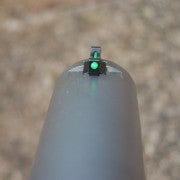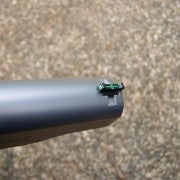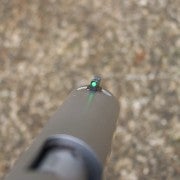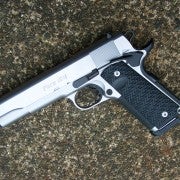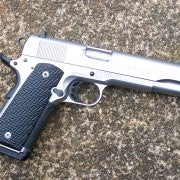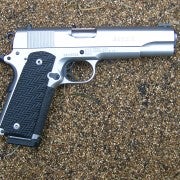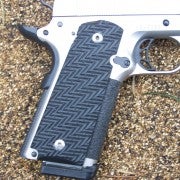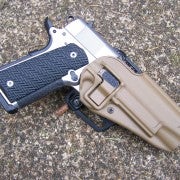Gun Review: Para USA “Expert”
Pat Cascio 10.06.15

I’ve been a sucker for a good 1911-style pistol ever since I owned my first one way back in the mid or late 1960s. There’s just something about a good 1911 that calls out to me. Sure, over the years I’ve had some real stinkers–clones or near clones of a 1911–that didn’t work no matter what I did to ’em. I’ve had gunsmith training, and I was also trained as a military armorer, one of my several MOS skills, on the 1911 as well as the M1 Garand and the M-14. So I know a little bit about the 1911, and I’ve built quite a few as well as customized a lot of 1911s. I keep a well-stocked 1911 parts box in my office. If I’m not working on a 1911 of my own, then I’m probably working on one for a friend or repairing one for the local gun shop.
I still remember when Para USA first came on the scene. They were called “Para Ordnance” before changing the name to Para USA when they moved from Canada to the USA, and the only thing they manufactured were hi-cap 1911 frames, something new and unheard of in the 1911 market. Back in the day, you could have a 1911 any way you wanted it so long as it was either a Government Model or a Commander Model, both coming with the standard 7-round magazine. Para shook-up the 1911 industry with a 1911 frame that held 14 rounds of big ‘ol .45ACP rounds. Of course, you had to buy a slide and barrel to fit on that Para frame, and many people did. Only thing was, folks building on the Para frame weren’t all that skilled and thought you could just “assemble” a 1911 instead of fitting the parts. There were many dismal results, and the Para-framed 1911s just didn’t work.
Some years down the road, Para Ordnance decided to start building complete high-capacity 1911s of their own design, and it was a success story–somewhat. At some point, Para moved to the USA and became Para USA, and there were problems with their guns. They just weren’t as nicely made or fitted as those they were manufacturing up in Canada. The problems persisted for a long, long time, and I’m here to tell you, their customer service was lacking, big time! I once sent half a dozen P-14 magazines back to Para USA because they either wouldn’t feed or several of ’em wouldn’t even come close to holding 14 rounds in the mags as advertised. It took about a month for Para USA to return new mags to me, but they did work!
Today, Para USA no longer exists, at least in the sense that they will be making any more 1911s stamped with the Para name on them. They will be producing Remington 1911s at the new Para factory. And to be sure, the Remington 1911s have been plagued with problems. Most were poorly fit and would shoot loose in short order. So let’s hope that the new Para plant in Alabama can produce Remington 1911s that work properly.
Meet the Expert
I’ve owned a number of different models of Para USA 1911s, and the one under review today is their “economy” model they call the “Expert,” and it’s anything but a low-end quality gun. It’s first class in all respects. I have the all stainless steel Expert, and a quick look at the specs are in order.
We have a “Government” sized 1911 with a 5″ match-grade barrel that fits very nicely. The slide has a green fiber optic front sight, and the rear sight is a Plain Jane 2-dot sight. (I wish they would have put a better rear sight on this gun–more on this later.) The frame and slide are stainless steel as mentioned, and there is an oversized and flared ejection port for sure ejection of empty brass as well as loaded rounds. A beavertail grip safety and a match-grade plastic trigger–why not aluminum? Polymer grips round out the gun, along with a combat thumb safety and two 8-round magazines.
First thing I wanted to do was change out the rear sight. I wanted a “combat” style rear sight. Numerous e-mails and phone calls to Para USA went unanswered for weeks and weeks. I finally reached someone on the phone, who told me that they were in the process of moving to Alabama and couldn’t fill any orders for any spare parts. And no warranty work was being done, either. So, if you have a Para 1911 that was sent in for warranty work, don’t expect it back any time soon! They won’t even have the new plant up and running until March or April.
The match-grade plastic trigger was gritty on my Expert sample, and it is a gun I personally own, not a gun writer’s sample. I spent some time cleaning up the trigger pull, and it’s much better, now. Nice and crisp. I’m going to replace the plastic trigger with one that is match-grade aluminum one of these days. The grips safety released about 1/3rd of the way in–great. That green fiber optic front sight was easy to see, too. I replaced the factory recoil spring with a heavier one (I shoot a lot of +P .45ACP in my 1911s), and it’s a good idea to use a heavier recoil spring to prevent the frame from getting battered.
Para advertises on their current website that the Expert is “hand-tuned on the bench and test fired.” Well, I’m thinking my sample slipped through. It wouldn’t reliably feed FMJ ammo, so I polished the breach face and the top inside of the barrel’s chamber. This only took a few minutes, but I expected more from my Expert. It was a brand-new gun.
At the Range
I settled in to give my Expert a good workout, and I had a great supply of .45ACP ammo on-hand. From Black Hills Ammunition Black Hills Ammunition | The Power of Performance I had their 230-gr FMJ load, along with their 185-gr and 230-gr JHP loads. From Buffalo Bore Ammunition, www.buffalobore.com I had their 230-gr FMJ FN +P load, 160-gr Barnes TAC-XP low recoil, standard velocity load–same load in 185-gr +P loading, 200-gr JHP +P and 230-gr JHP +P My Expert had no problems with any of these loads once I polished the breach face and the chamber of the barrel. In all, I fired more than 500-rounds during my testing over several shooting sessions.
The overall winner in the accuracy department was the Buffalo Bore 200-gr JHP +P loading. If I did my part, I could keep all shots inside of a 3 1/2-inch circle at 25-yards, resting the gun over a sleeping bag on the hood of my pick-up truck. All the other loads were right around 4-inches or so. I also carried the Expert in a Blackhawk Products SERPA belt holster www.blackhawk.com, and this holster keeps the gun high and close to the body.
I want to comment on the two 8-round mags that came with the gun. I had no problems with the mags at all, they just seemed a little bit flimsy if you ask me. They’re not mags I’d want to bet my life on, but they’re fine for range use. I think Para could make better magazines. I also removed the black plastic grips on the Expert and replaced them with a pair of my own designed “Code Zero” 1911 grips manufactured by Mil-Tac Knives and Tools. I found the grips that came on the Expert a bit too thin to my liking, and quite honestly I thought they looked cheap.
Some of the changes I made to my Expert sample were “druthers” and didn’t need changing, like the grips. However, if my Expert was “hand-tuned” before leaving the factory, then someone was asleep at the bench. The gun wouldn’t feed FMJ ammo when I got it. I could have sent the gun back to the factory, but who knows when I would have received it back, what with the move and all. Besides, I enjoy working on 1911s. There’s almost always something I can improve when it comes to most 1911s.
I’m assuming now that Para USA is out of business for the most part in that they won’t be producing any more 1911s with the Para USA stamp on the slide and frame. So I imagine that the Para guns on the market will probably command a little more money. For the most part, I’ve had excellent 1911s from Para over the years, and I believe my Expert sample just slipped out of the factory for some reason before it was really tested for function. The gun was accurate enough for combat use, and I wouldn’t hesitate taking it into combat or use it for concealed carry on the mean streets. At this point I have confidence in the Expert, but only after some tweaks.
